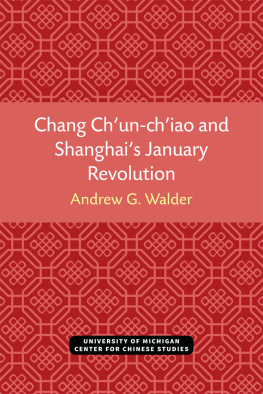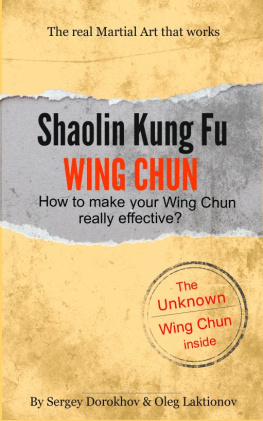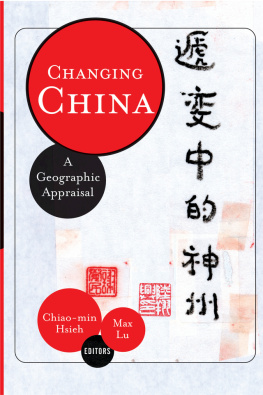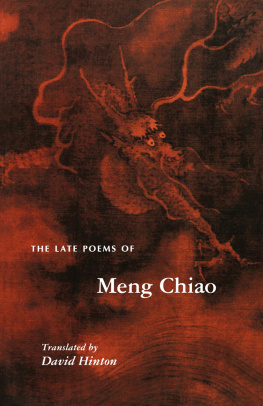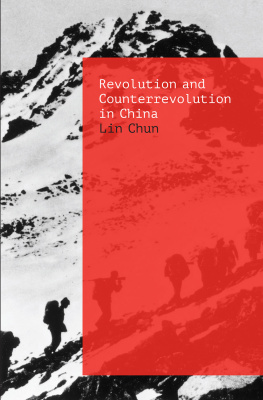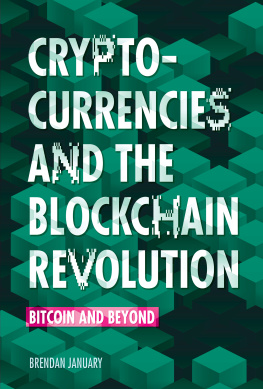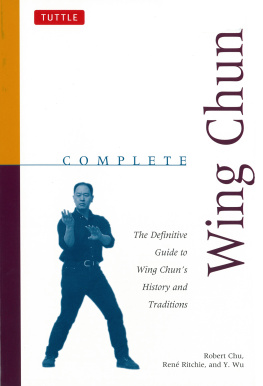Andrew G. Walder - Chang Chun-Chiao and Shanghais January Revolution
Here you can read online Andrew G. Walder - Chang Chun-Chiao and Shanghais January Revolution full text of the book (entire story) in english for free. Download pdf and epub, get meaning, cover and reviews about this ebook. year: 2020, publisher: Kenneth G. Lieberthal and Richard H. Rogel Center for Chinese Studies, genre: Politics. Description of the work, (preface) as well as reviews are available. Best literature library LitArk.com created for fans of good reading and offers a wide selection of genres:
Romance novel
Science fiction
Adventure
Detective
Science
History
Home and family
Prose
Art
Politics
Computer
Non-fiction
Religion
Business
Children
Humor
Choose a favorite category and find really read worthwhile books. Enjoy immersion in the world of imagination, feel the emotions of the characters or learn something new for yourself, make an fascinating discovery.
- Book:Chang Chun-Chiao and Shanghais January Revolution
- Author:
- Publisher:Kenneth G. Lieberthal and Richard H. Rogel Center for Chinese Studies
- Genre:
- Year:2020
- Rating:5 / 5
- Favourites:Add to favourites
- Your mark:
- 100
- 1
- 2
- 3
- 4
- 5
Chang Chun-Chiao and Shanghais January Revolution: summary, description and annotation
We offer to read an annotation, description, summary or preface (depends on what the author of the book "Chang Chun-Chiao and Shanghais January Revolution" wrote himself). If you haven't found the necessary information about the book — write in the comments, we will try to find it.
Chang Chun-Chiao and Shanghais January Revolution — read online for free the complete book (whole text) full work
Below is the text of the book, divided by pages. System saving the place of the last page read, allows you to conveniently read the book "Chang Chun-Chiao and Shanghais January Revolution" online for free, without having to search again every time where you left off. Put a bookmark, and you can go to the page where you finished reading at any time.
Font size:
Interval:
Bookmark:

THE UNIVERSITY OF MICHIGAN CENTER FOR CHINESE STUDIES
MICHIGAN PAPERS IN CHINESE STUDIES
NO. 32
CHANG CHUN-CHIAO AND SHANGHAIS JANUARY REVOLUTION
by
Andrew G. Walder
Ann Arbor
Center for Chinese Studies
The University of Michigan
1978
ISBN 0-89264-032-2
Copyright 1978
by
Center for Chinese Studies
The University of Michigan
Printed in the United States of America
ISBN 978-0-89264-032-4 (hardcover)
ISBN 978-0-472-03825-1 (paper)
ISBN 978-0-472-12784-9 (ebook)
ISBN 978-0-472-90180-7 (open access)
CONTENTS
Chinese Marxism is unique in the world communist movement for the theoretical and practical solutions it has offered for the problem of maintaining unbroken change in social relations after the initial establishment of socialism. For a prominent contingent within the Chinese Communist movement, it has been insufficient to redistribute the means of production and end the exploitative aspects of the old society. Production relations, which include for this contingent not only property relations but all social relations embodied in forms of distribution, enterprise rules and regulations, and economic coordination, must be continually transformed to eliminate all vestiges of class distinction.
This transformation is to take place largely through the conscious effort of people who live these relations in their daily lives. All literature and art, reflections of these social relations, must be mobilized to help facilitate this transformation. Individuals inside and out of the Party who resist these continuous changes as being detrimental to the rapid development of a socialist economy or as being harmful to literary and artistic creativity must be struggled with politically so that these changes can move forward.
Chang Chun-chiao has been one of the more prominent theoreticians and practitioners of this stream of Chinese Marxism, and the January Revolution has become symbolic of efforts both to promote social and political change and to overcome resistance to these changes by prominent Party and non-Party figures. The study in this volume traces the shifting involvement of Chang in the Cultural Revolution in Shanghai and the social forces in Chinese society which, once set off by the Cultural Revolution, decisively altered events in the city. Chang emerges as a complex political figureboth instigator and suppressor of political conflict, alternately champion and enemy of rebellionand is throughout a protector of the ideals of his branch of Marxism who singlemindedly pushed for their realization through a number of sharp tactical turns. The January Revolution not only reminds us that classes continue to exist under socialism, as Chinese Marxists are the first to admit, but it also highlights the fact that a socialist society is capable of generating contradictions and conflicts that are distinctively its own.
This essay has benefited considerably from unusually perceptive comments upon various drafts offered by Lowell Dittmer, Albert Feuerwerker, Kenneth Lieberthal, Michel Oksenberg, and Ernest Young. Two others responded generously to my requests for assistance: Hong Yung Lee by allowing me access to his index of Red Guard materials, and Lynn T. White III by providing material from his own research and by helping to clarify certain points of confusion. Perhaps most importantly, without Michel Oksenbergs stimulating leadership of our seminar on Chinese politics and his active encouragement of my fascination with Chinas radical political figures, my efforts would never have been channeled in this direction. This expression of gratitude in no way confers responsibility for this piece on those mentioned above. Remaining weaknesses are in spite of their efforts.
Two others contributed in various other, but no less important ways, to the completion of this study. Marlene Thom served as an enthusiastic and capable editor, and George Walders constant stream of clippings from the Washington Post helped his son keep abreast of major developments in post-Mao politics with a minimum of effort.
Andrew G. Walder
Ann Arbor, Michigan
July 1977
| AS | Asian Survey |
| CB | Current Background |
| CCP Documents | Union Research Institute, CCP Documents of the Great Proletarian Cultural Revolution |
| CCRG | Central Cultural Revolution Group |
| CFJP | Chieh-fang Jih-pao |
| CNA | China News Analysis |
| CNI | China News Items from the Press |
| CNS | China News Summary |
| CQ | China Quarterly |
| CS | Current Scene |
| DSJP | Daily Summary of the Japanese Press |
| FBIS | Foreign Broadcast Information Service, Daily Report (Far East) |
| FE | British Broadcasting Corporation, Summary of World Broadcasts (Far East) |
| FEER | Far Eastern Economic Review |
| HMWP | Hsin-min Wan-pao |
| JMJP | Jen-min Jih-pao |
| JPRS | Joint Publications Research Service |
| KMJP | Kuang-ming Jih-pao |
| MPC | Municipal Party Committee |
| NCNA | New China News Agency |
| PCJP | Pei-ching Jih-pao |
| PLA | Peoples Liberation Army |
| SCMM | Selections from China Mainland Magazines |
| SCMM(S) | Selections from China Mainland Magazines (Supplement) |
| SCMP | Survey of the China Mainland Press |
| SCMP(S) | Survey of the China Mainland Press (Supplement) |
| SCPRM | Selections from Peoples Republic of China Magazines |
| URS | Union Research Service |
| URS Bio | Union Research Service Biographical Service |
| WGHQ | Shanghai Workers General Headquarters |
| WHP | Wen-hui Pao |
Shanghais January Revolution was a highly visible and, by all accounts, crucially important event in Chinas Cultural Revolution. Its occurrence, along with the subsequent attempt to establish a commune form of municipal government, has greatly shaped our understanding both of the goals originally envisaged for the Cultural Revolution by its leaders and of the political positions held by the new corps of Party leaders thrust upward during its coursemost notably Chang Chun-chiao. At this interpretive level, the events in Shanghai seem to embody in microcosm the issues and conflicts in Chinese politics during the Cultural Revolution as a whole, while at the same time shaping our conception of what these larger issues and conflicts were. At a more general, theoretical level, however, the events in Shanghai provide us with an unusual opportunity (thanks to Red Guard raids on Party offices) to view the internal workings of the Party organization under a period of stress and to observe unrestrained interest group formation and mass political conflict through the press accounts provided by these unofficial groups themselves. The January Revolution thus provides us with an opportunity to develop better our more abstract, theoretical understanding of the functioning of the Chinese political system and the dynamics of the social system in which it operates.
At the level of interpretation a single themethat the January Revolution was a victory of Revolutionary Rebels over an entrenched municipal bureaucracy actively resisting and/or suppressing the emerging movementhas dominated most writings on the Cultural Revolution in Shanghai.Chang Chun-chiao as a radical ideologue who assisted the rebel struggle in order to create a democratic commune in Shanghai.
Font size:
Interval:
Bookmark:
Similar books «Chang Chun-Chiao and Shanghais January Revolution»
Look at similar books to Chang Chun-Chiao and Shanghais January Revolution. We have selected literature similar in name and meaning in the hope of providing readers with more options to find new, interesting, not yet read works.
Discussion, reviews of the book Chang Chun-Chiao and Shanghais January Revolution and just readers' own opinions. Leave your comments, write what you think about the work, its meaning or the main characters. Specify what exactly you liked and what you didn't like, and why you think so.

